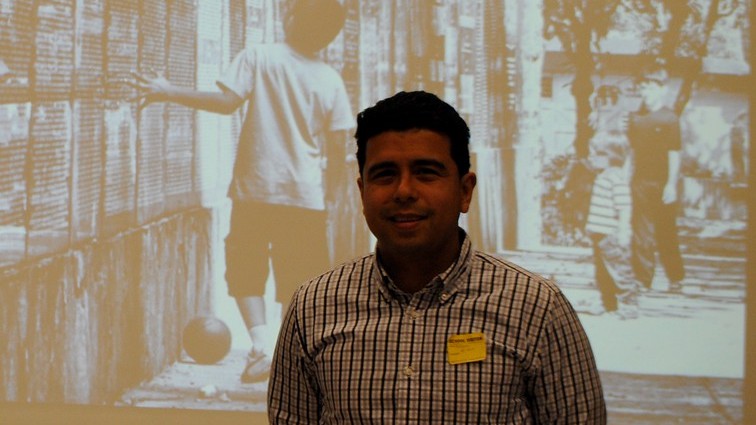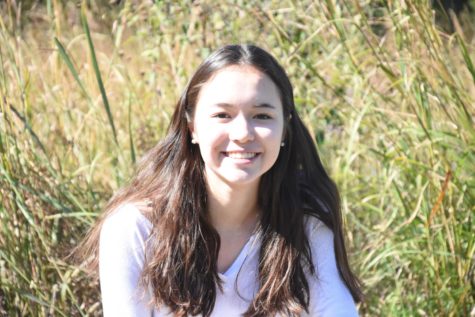WW ’16: Nelson DeWitt shares the story of reconnecting with his birth family
Above is Nelson DeWitt, who spoke to WHS students during Winter Week. DeWitt shared his experience of discovering that he was one of the missing children taken from his family in El Salvador during the Salvadoran Civil War. “It’s important to put ourselves in other people’s shoes, but it is often very hard to do so,” DeWitt said.
February 10, 2016
Nelson DeWitt gave a presentation to WHS students on Friday Feb., 5. DeWitt explained his story from childhood to present.
DeWitt was separated from his birth family when he was two years old during the Salvadoran civil war in El Salvador. His mother died in the civil war, and he was adopted by a family in Boston.
When DeWitt was 16 years old, his foster father received a phone call from physicians from Human Rights who told him that DeWitt’s biological parents were revolutionaries in the civil war. DeWitt’s grandmother had spent 14 years looking for him. DeWitt was unaware of his family and background.
After a long waiting period, DeWitt used an organization called “Pro-Búsqueda” to help him reconnect with his biological family. Later that year, he finally traveled to Costa Rica to reunite with his biological family who knew him as Roberto Coto.
“They basically did the research,” DeWitt said. “They connected the only baby photo my grandmother had of me to a photo that appeared in the newspaper. Then they were able to piece it together with my family back in the U.S.”
DeWitt believed that through empathy, the WHS student body could understand his story better. “It’s important to put ourselves in other people’s shoes, but it is often very hard to do so,” DeWitt said.
Throughout the presentation, DeWitt included examples from “The Hunger Games” and “Harry Potter.” Because many students and teachers have read or watched these two novels and movies, DeWitt thought it would be a good way for students to relate to his story.
“If we can learn to connect with the characters like Katniss Everdeen and Harry Potter, we can begin to understand the worldview of other people and what they are going through,” DeWitt said.
Nelson DeWitt was able to speak to a group of students at Wayland High School because of World Languages and Classics department head Melissa Bryant.
“Mr. Krasnoo, our Latin teacher, worked for several years at a YMCA summer camp in the Sturbridge area, during which time Nelson was a counselor,” Bryant said. “He got to know Nelson and has followed his work on a documentary project over the years, and we had previously talked about inviting him into Spanish classes to speak.”
Bryant was thrilled that DeWitt was able to come to WHS because students always tell her that they empathize more with speakers who tell their personal story. She was also excited about DeWitt’s content.
“I feel this is a great opportunity for young people to hear and listen to someone who knows first hand about the devastation of Inter-American politics and civil war and human rights abuses.” Bryant said.





![Last Wednesday, the Wayland School Committee gathered to discuss a number of topics regarding the health curriculum and Innovation Career Pathway course. Another large topic of conversation was the ways to potentially mitigate distracting cell phone usage. "These [phones] are going to distract your learning and social relationships," Superintendent David Fleishman said. "That's concrete right there."](https://waylandstudentpress.com/wp-content/uploads/2025/06/Screenshot-2025-06-04-at-9.49.31 PM-1200x886.png)



























![Troy Hoyt finishes the Boston Marathon, running for the Hoyt Foundation. T. Hoyt is the son of Hoyt Foundation CEO Russ Hoyt.
“[Running a marathon] might seem like a big thing, when it’s presented to you at first, but if you break it up and just keep telling yourself, “Yes, you can,” you can start chipping away at it. And before you know it, you’ll be running the whole 26 miles, and you won’t even think twice about it.” T. Hoyt said.](https://waylandstudentpress.com/wp-content/uploads/2025/04/C36E8761-1CBB-452E-9DF2-543EF7B1095E_1_105_c.jpeg)













































